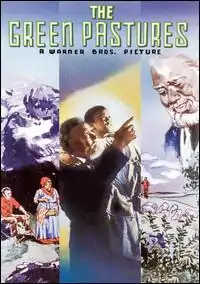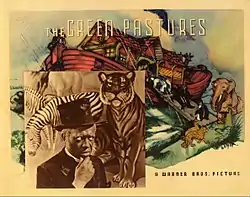The Green Pastures (film)
The Green Pastures is a 1936 American film depicting stories from the Bible as visualized by black characters. It starred Rex Ingram (in several roles, including "De Lawd"), Oscar Polk, and Eddie "Rochester" Anderson. It was based on the 1928 novel Ol' Man Adam an' His Chillun by Roark Bradford and the 1930 Pulitzer Prize-winning play of the same name by Marc Connelly.
| The Green Pastures | |
|---|---|
 | |
| Directed by | Marc Connelly William Keighley |
| Produced by | Jack L. Warner |
| Screenplay by | Sheridan Gibney |
| Based on | The Green Pastures & Ol' Man Adam an' His Chillun 1930 play & 1928 novel by Marc Connelly & Roark Bradford |
| Starring | Rex Ingram Oscar Polk Eddie Anderson Ernest Whitman |
| Music by | Erich Wolfgang Korngold |
| Cinematography | Hal Mohr |
| Edited by | George Amy |
| Distributed by | Warner Bros |
Release date |
|
Running time | 93 min. |
| Country | United States |
| Language | English |
| Budget | $800,000 (estimated) |
| Box office | $3,300,000 (estimated by 1939) |

The Green Pastures was one of only six feature films in the Hollywood Studio era to feature an all-black cast, though elements of it were criticised by civil rights activists at the time and subsequently.[1]
Plot summary
God tests the human race in this reenactment of Bible stories set in the world of black American folklore.
Cast
- Rex Ingram as De Lawd / Adam / Hezdrel
- Oscar Polk as Gabriel
- Eddie "Rochester" Anderson as Noah
- Frank Wilson as Moses
- George H. Reed as Mr. Deshee / Aaron
- Abraham Gleaves as Archangel
- Myrtle Anderson as Eve
- Al Stokes as Cain
- Edna Mae Harris as Zeba
- James Fuller as Cain the Sixth
- George Randol as High Priest
- Ida Forsyne as Noah's Wife
- Ray Martin as Shem
- Charles Andrews as Flatfoot
- Dudley Dickerson as Ham
- Jimmy Burress as Japheth
- Billy Cumby as Abraham / Head Magician / King of Babylon
- Ivory Williams as Jacob
- David Bethea as Aaron
- Ernest Whitman as Pharaoh
- Reginald Fenderson as Joshua
- Slim Thompson as Master of Ceremonies
- Clinton Rosemond as Prophet
- Hall Johnson Choir as Vocal Ensemble
- Willie Best as Henry - the Angel (uncredited)
- Jesse Graves as General (uncredited)
- Clarence Muse as Angel (uncredited)
- Fred Toones as Zubo (uncredited)
Reception
Despite criticisms about its racial stereotyping, The Green Pastures proved to be an enormously popular film. On its opening day at New York's Radio City Music Hall, tickets sold at a rate of 6,000 per hour. The film was held over for an entire year's run at some theaters. It remained the highest-grossing all-black-cast film until the release of Carmen Jones in 1954.
Writing for The Spectator in 1936, Graham Greene gave the film a generally good review, speculating that audiences "will find [it] continuously entertaining, if only intermittently moving". Greene praised director Connelly in particular, describing scenes of "excellent" melodrama, his "ingenious [use of] pathos", and the "admirable" restraint evident in the simplicity of the settings.
Greene's only complaints about the film was that "one may feel uneasy at Mr. Connelly's humour" and his depiction of "the negro mind". Greene noted that "the result is occasionally patronising, too often quaint, and at the close of the film definitely false", but ultimately he concludes that the film is "as good a religious play as one is likely to get in this age from a practiced New York writer".[2]
References
- G. S. Morris, "Thank God for Uncle Tom – Race and Religion Collide in The Green Pastures", Bright Lights, Issue 59, February 2008.
- Greene, Graham (4 December 1936). "The Green Pastures". The Spectator. (reprinted in: Taylor, John Russell, ed. (1980). The Pleasure Dome. Oxford University Press. pp. 121-122. ISBN 0192812866.)
External links
| Wikimedia Commons has media related to The Green Pastures (film). |